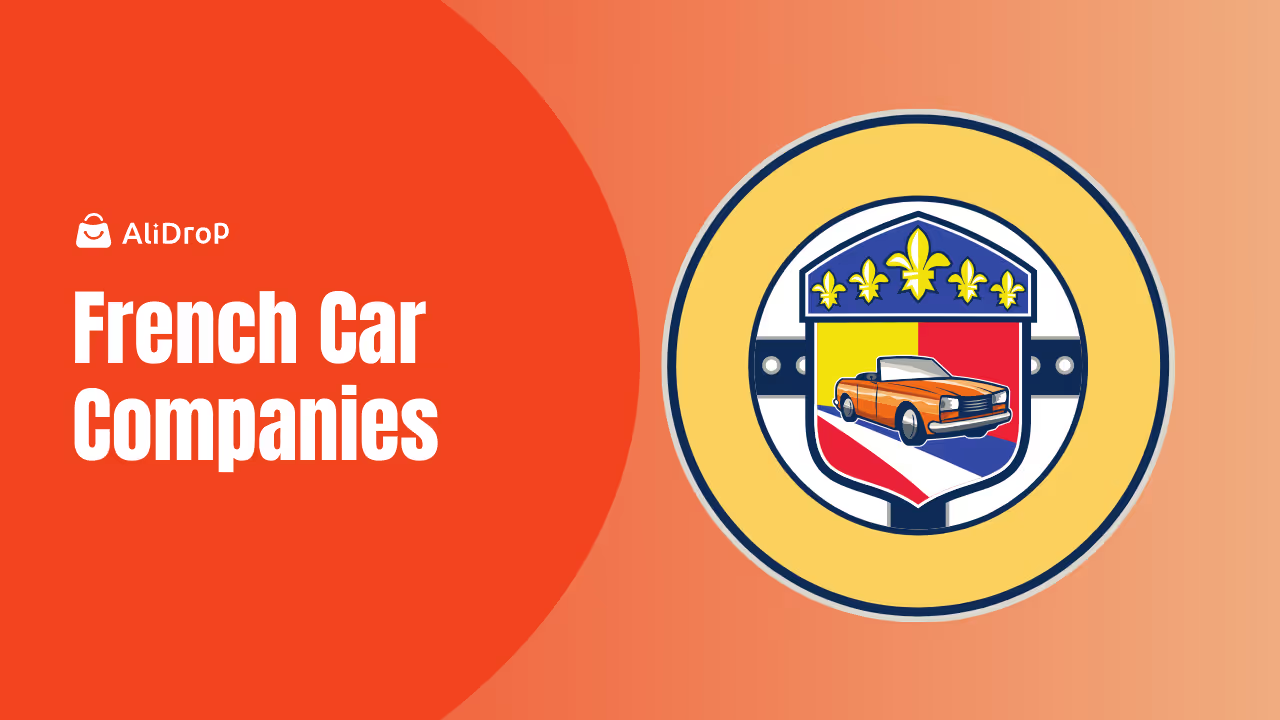When you think of French car companies, images of stylish designs, innovative technology, and a rich automotive history come to mind. Brands like Renault, Peugeot, and Bugatti have long been at the forefront of the global automotive scene. But it’s not just about tradition—these companies are also shaping the future of transportation.
From electric vehicles that lead the charge toward sustainability to luxury cars that redefine performance, French manufacturers have always pushed boundaries. Whether it’s the pioneering spirit of Citroën, the sporty elegance of Alpine, or the unmatched luxury of Bugatti, French car companies combine cutting-edge technology with an unmistakable flair.
In this guide, we’ll take you through the legacy, innovations, and exciting future of French car brands. We’ll explore how these iconic names have influenced the industry and are continuing to lead in the world of electric, luxury, and performance vehicles. Ready to explore? Let’s dive in!
A Deep Dive into the History of French Car Manufacturers: From Pioneers to Industry Leaders
French car companies have always played a significant role in shaping the global automotive landscape. From their humble beginnings in the late 19th century to becoming household names, French manufacturers like Renault, Peugeot, and Citroën have set trends that continue to inspire carmakers worldwide. In this section, we’ll take a look at the origins and historical milestones of these iconic brands, highlighting their journey from pioneers to industry leaders.
Renault: Driving French Innovation Since 1899
Renault has been a cornerstone of the French automotive industry since its founding in 1899 by Louis Renault. What started as a small workshop quickly turned into a powerhouse known for its innovation. From the Renault 4CV in the 1940s, which made cars affordable for the average family, to the more recent Renault Zoe, which has helped define electric mobility, Renault has always been about making cars that fit into people's lives.
One of the company’s standout achievements was the development of the Renault E-Tech, a step into the electric future. Today, the brand continues to lead with the Renault Megane E-Tech and other electric models, maintaining its legacy of innovation. Renault's focus on sustainability is a testament to its commitment to the future of mobility, making it an essential player in the electric vehicle (EV) revolution.
Peugeot: A Legacy of Excellence in Design and Engineering
Peugeot, originally founded as a steel mill in 1810, transformed into one of France's most well-respected automobile manufacturers. Since its debut in the early 20th century, Peugeot has been synonymous with reliable, stylish cars. From the early Peugeot 201, one of the first mass-produced cars in the world, to the current Peugeot 208, known for its striking design and efficiency, the brand has continually pushed the envelope in automotive excellence.
What sets Peugeot apart is its ability to blend tradition with modernity. Today, the Peugeot e-208 is a shining example of how the brand is embracing the future while staying true to its roots. With a focus on eco-friendly options and design innovation, Peugeot is positioning itself as a key player in both the electric car market and the global automotive industry.
Citroën: Pioneering Design and Revolutionary Features
Citroën, founded in 1919 by André Citroën, has long been known for its avant-garde approach to design. From the Traction Avant, one of the first cars to feature front-wheel drive, to the Citroën DS, a groundbreaking car that introduced hydro-pneumatic suspension, Citroën has always dared to be different. The company’s focus on providing revolutionary design and technology set the stage for modern-day automotive innovations.
Citroën’s commitment to innovation didn’t stop with the past. Today, Citroën continues to offer vehicles like the ë-C4, an electric vehicle that combines advanced tech with the comfort and style that the brand is known for. As part of Stellantis, Citroën is evolving with the times, introducing new electric models that appeal to today’s eco-conscious drivers while maintaining the quirky charm that made the brand famous.
Luxury and Performance: The Prestige of French Car Brands in the Global Market
French car companies have long been synonymous with luxury, elegance, and high performance. Brands like Bugatti, DS Automobiles, and Alpine represent the pinnacle of automotive craftsmanship, blending cutting-edge technology with exceptional design. In this section, we will dive into the legacy of these iconic French luxury brands and how they continue to push the boundaries of what’s possible on the road.
Bugatti: The Ultimate in Speed and Luxury
Bugatti, founded in 1909 by the visionary Ettore Bugatti, is a name that immediately evokes images of speed, luxury, and exclusivity. Known for producing some of the most iconic hypercars in the world, Bugatti continues to set the standard for high-performance vehicles. The Bugatti Veyron, released in 2005, became a symbol of automotive engineering excellence, with its mind-boggling top speed and engineering innovations.
More recently, the Bugatti Chiron has taken performance to the next level, boasting a 1,500 horsepower engine and breaking records worldwide. With the introduction of the Bugatti Tourbillon, a hybrid hypercar, Bugatti is also looking towards a future where sustainability doesn’t compromise performance. The brand remains a benchmark in luxury sports cars, combining the best of cutting-edge technology and French automotive craftsmanship.
DS Automobiles: A New Standard for French Luxury and Technology
Originally a luxury variant under Citroën, DS Automobiles was launched as a standalone brand in 2014. Its mission? To redefine French luxury with innovation, technology, and design. DS Automobiles quickly made a name for itself with cars like the DS 7 Crossback and DS 3 Crossback, which combine refined design with futuristic technology.
Today, DS Automobiles continues to elevate French luxury, focusing on electric vehicles like the DS 3 E-Tense and DS 7 E-Tense, signaling its commitment to sustainable innovation. The brand is known for incorporating cutting-edge features such as active suspension and 360-degree cameras, making each drive not just a journey, but an experience. With a focus on exclusivity and French savoir-faire, DS Automobiles is positioning itself as a competitor to the best luxury brands in the world.
Alpine: Racing DNA Meets Road Performance
Alpine, founded in 1955, has always been synonymous with motorsport excellence. Known for dominating the rally scene, Alpine quickly became a brand associated with high-performance vehicles designed for both the racetrack and the road. The brand’s most famous model, the Alpine A110, has been a fan favorite for its lightweight design, precision handling, and racing pedigree.
In recent years, Alpine has expanded its appeal to a wider audience while maintaining its performance-driven ethos. The brand has entered the electric era with the upcoming Alpine A290 electric sports car, designed to bring Alpine’s performance-focused legacy into the future. Alpine’s dedication to blending motorsport excellence with cutting-edge technology makes it a standout in the world of French luxury sports cars, offering an unparalleled driving experience.
The Future of French Car Companies: Electric, Autonomous, and Sustainable Innovation
As the automotive world shifts toward sustainability, electrification, and advanced technology, French car companies are making bold moves to stay ahead of the curve. With a growing emphasis on electric vehicles (EVs), autonomous driving, and green manufacturing, brands like Renault, Peugeot, and Citroën are actively shaping the future of mobility. In this section, we’ll explore how French car companies are leading the way in the next chapter of automotive evolution.
The Electric Revolution: How French Car Companies Are Shaping the Future
The push for electric vehicles (EVs) is one of the most exciting developments in the global car industry, and French manufacturers are at the forefront of this change. Renault, for example, has long been a pioneer in electric mobility, with the Renault Zoe becoming one of the best-selling electric cars in Europe. Building on that success, Renault is expanding its electric lineup with models like the Megane E-Tech and plans for a more extensive range of EVs in the coming years.
Not to be outdone, Peugeot has embraced electrification with the Peugeot e-208 and e-2008, which combine sleek design with impressive electric performance. Meanwhile, Citroën is taking bold steps with their ë-C4, showing that electric doesn’t have to mean sacrificing comfort or style. French automakers are pushing for a cleaner, greener future, and they’re making sure that electric cars are accessible, efficient, and stylish.
Autonomous Driving: The French Approach to the Future of Mobility
As self-driving technology continues to evolve, French car companies are positioning themselves to be leaders in the autonomous vehicle (AV) space. Renault has been a pioneer in integrating semi-autonomous driving features in their vehicles, such as the Renault Clio and Megane. These cars feature advanced driver-assist systems like lane-keeping assist and adaptive cruise control, offering a taste of the autonomous future.
In addition, Peugeot and Citroën are heavily investing in autonomous driving technology. Peugeot’s partnership with FCA (Fiat Chrysler Automobiles) and its parent company Stellantis aims to integrate AI and autonomous capabilities in future models. While fully autonomous cars aren’t yet mainstream, French carmakers are leading the charge by making incremental strides toward a future where self-driving cars are an everyday reality.
Sustainable Manufacturing and Green Tech in the French Car Industry
Sustainability is not just about making electric cars—it's about how those cars are made. French car companies are putting significant effort into ensuring that their manufacturing processes are as eco-friendly as their vehicles. For instance, Renault is working towards a circular economy, where cars are designed with recycling in mind, and materials are reused and repurposed to reduce waste.
Peugeot and Citroën are equally committed to sustainable manufacturing, with both brands working to reduce their carbon emissions and embrace green technologies. Peugeot’s production facility in Sochaux, France, has significantly lowered its carbon footprint by adopting energy-efficient processes and using renewable energy sources. In addition, Citroën is incorporating eco-friendly materials in their vehicles, such as recycled plastics and natural fibers, which further emphasize their commitment to sustainability.
Through green technologies, electric mobility, and sustainable manufacturing, French car companies are not just reacting to global trends—they are setting the standard for the automotive industry’s future.
French Car Brands Leading the Way in Design and Performance: Blending Art with Engineering
French car brands have always been at the intersection of artistic design and engineering excellence. While many automakers focus solely on performance or practicality, French manufacturers have mastered the art of blending both with aesthetic appeal. Whether it's the futuristic designs of Citroën, the bold and elegant styling of Peugeot, or the luxury and speed of Bugatti, French cars are known for their unique blend of creativity and performance.
The Art of French Car Design: Beauty Meets Functionality
When you think of French cars, you think of style. French manufacturers have a long history of producing cars that are not only efficient but also visually striking. Citroën, for instance, has become synonymous with avant-garde design. The Citroën DS, for example, stunned the world in the 1950s with its sleek lines and hydropneumatic suspension system, a design that was as revolutionary as it was visually captivating.
Peugeot, too, has embraced bold, forward-thinking designs. Models like the Peugeot 3008 and Peugeot 508 combine elegant, aerodynamic styling with cutting-edge features. These cars aren’t just vehicles; they’re works of art on wheels.
The Powerhouse Performance of French Engineering
French car brands don’t just excel in design—they also lead in performance. Bugatti, known for its unrivaled speed, has been at the top of the performance car world for over a century. The Bugatti Chiron and Veyron are legendary, not only for their extraordinary speed but for their ability to combine luxury with high-performance engineering. Bugatti's vehicles push the boundaries of what’s possible, combining cutting-edge technology with exquisite craftsmanship.
Meanwhile, Alpine, the brand that has its roots in motorsport, continues to blend lightweight design with powerful performance. The Alpine A110 remains a favorite among driving enthusiasts for its agility and road-handling capabilities, proving that French engineering is not just about luxury but also about thrilling driving experiences.
Functionality in the Details: The Subtle Yet Powerful French Innovations
Beyond the sleek exteriors and impressive performance, French car brands excel in subtle innovations that enhance functionality. From advanced safety features to intuitive driver-assist systems, French cars integrate technology in ways that prioritize the user experience. For example, Peugeot’s i-Cockpit in the 208 is a driver-focused design that puts control at your fingertips while making the driving experience feel more connected and immersive.
Citroën’s Advanced Comfort® suspension offers a smooth, luxurious ride, making long journeys feel effortless. These practical innovations are seamlessly integrated into the designs, ensuring that form follows function without compromise.
Conclusion: Why French Car Brands Are the Backbone of Automotive Innovation
French car brands have proven themselves as leaders in automotive innovation. From Renault's electric revolution to Peugeot’s cutting-edge design and Bugatti’s world-class performance, French manufacturers are not just keeping pace with the industry—they're setting trends. With their unique blend of luxury, engineering, and sustainability, these brands have shaped the automotive world, offering vehicles that stand out for both style and substance.
Looking ahead, French car companies are primed to continue their leadership in electric mobility, autonomous technology, and sustainable practices. With a legacy of combining heritage and innovation, French brands will remain at the forefront of the industry, offering cars that blend performance, design, and eco-conscious innovation in ways that few others can match. The future of driving has a distinct French flair.














